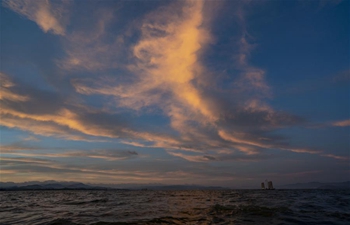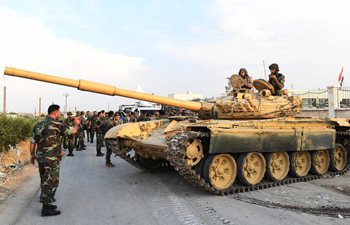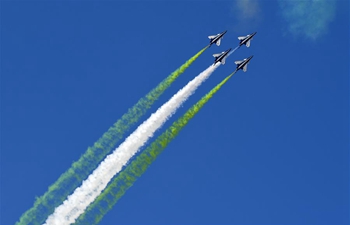by Burak Akinci
ANKARA, Oct. 23 (Xinhua) -- The agreement struck by Russia and Turkey on Tuesday to jointly control the recently-held Kurdish territory in Syria seals Moscow's influence in the region, experts said.
With this unprecedented deal, Russia seems to have given its blessing to the Turkish offensive launched on Oct. 9 in northeastern Syria against a Kurdish-led force that had allied with the United States against the Islamic State (IS), but is considered as "terrorist" by Ankara.
Analysts agree that the pact paves the way for a shift in favor of Russia and Turkey in the Syrian map generated by U.S. President Donald Trump's abrupt decision two weeks ago to withdraw U.S. forces from northern Syria.
After the meeting of more than five hours in Sochi, Turkish and Russian presidents announced a wide-ranging agreement that included the withdrawal of the Syrian Kurdish People's Protection Units (YPG) members and their weapons to 30 km from the Turkish border within 150 hours.
Turkey will keep control of the area it has taken in its military offensive between the towns of Tal Abyad and Ras Al Ain. The YPG is also meant to withdraw from the towns of Manbij and Tal Rifaat.
"Russia seems to give a guarantee to the Turkish side by endorsing the Turkish operation and underlining the fact that the YPG would not be a threat anymore," Moscow-based Turkish political analyst Kerim Has commented.
"Russia has thus cemented its influence in the region and said the last word" in the crisis that erupted after Turkey launched cross-border Operation Peace Spring, the third of its kind in northern Syria since 2016, said Has.
The meeting between Russian President Vladimir Putin and his Turkish counterpart Recep Tayyip Erdogan followed a deal between NATO allies Turkey and United States which resulted in the suspension of Turkey's internationally criticized operations targeting the YPG, linked to the separatist Kurdistan Workers Party (PKK) in Turkey, a truce which expired on Tuesday night.
Turkey seeks to establish what it calls a "safe zone" extending more than 400 km wide along the Turkish-Syrian border and about 30 km deep inside Syria, where it plans to resettle about 2 million of the 3.6 million Syrian refugees currently living in Turkey.
Before flying to the Russian Black Sea resort, Erdogan hurled an ultimate warning to the Kurdish militia. "In case the promises to Turkey are not fulfilled, we won't be waiting as before. We will be going ahead with the operation and will keep on destroying the terrorists," he told reporters.
According to Has, both deals sealed by Ankara with Washington and now with Moscow have effectively removed Ankara's insisting security concerns to launch its long-awaited offensive. "Peace Spring is effectively and officially over, it cannot go on anymore," he argued.
Confirming the development, the Turkish Defense Ministry said in a statement early Wednesday that "in light of the (Sochi) agreement, there is no further need to engage at this stage for a new operation outside the present operation area," indicating that Turkish forces will not go beyond the territory currently under control.
Oytun Orhan, a Syrian expert and coordinator at the Ankara-based Center for Middle Eastern Studies (ORSAM), said that "Turkey's security concerns have largely been addressed with the agreement in Sochi."
"Russia not only declares that it comprehends Turkey's concerns and sensitivities regarding the YPG, it also assures that it will take measures to guarantee it," he said, referring to joint Turkish-Russian security patrols along the Syrian border announced in the deal.
The patrols will keep the Kurds out and help facilitate the return of refugees there, as Turkey is planning to repatriate millions of displaced Syrian in regions vacated by the Kurds.
The deal also means that Turkey would have to work with Damascus, supported by Russia, to address the YPG issue, because it refers to a Syrian-Turkish security agreement signed in Adana in southern Turkey in 1998, years before the eruption of the civil war in Syria.
"With the Sochi agreement, Russia says that it will be involved in activating subsequently the Adana deal, so this is another guarantee given to Ankara in regards to its legitimate security concerns," pointed out Orhan.
During Turkey's cross-border operation, some 20 civilians have been killed in Turkish border towns in mortar and rocket fire coming from YPG positions in northern Syria.
However, with a clear reference to the Adana agreement, Russia is also pushing Ankara to communicate with Syrian President Bashar al-Assad, noted Has.
"This is important because Moscow is keen to play a mediator role in establishing a dialogue between Damascus and Ankara in order for them to solve their problems," a move that would increase even more Russia's role as the main foreign player in Syria, added Has.

















